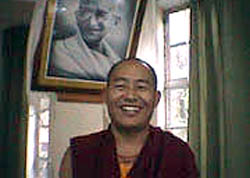
‘Tibet Will Be Autonomous Within A Decade Or Two’
by Gunvanthi Balaram
(Times of India. March 13, 2000)

Venerable Yeshi Togden
Mumbai:
'Tibet will be autonomous within a decade or two,' asserts Yeshe
Togden, founder-president of the Gu-Chu-Sum, an association of
ex-political prisoners in Tibet. The Buddhist monk is in town to
participate in the Festival of Tibet and deliver the valedictory
lecture on 'Tibet, the Chinese Gulag' on Friday.
'This is not wishful thinking, but a firm belief that is rooted in
two factors: one, international opinion is increasingly in favour of
freeing our country from China's clutches; two, the numbers of young
Chinese people who want their government to accept the Dalai Lama's
offer to hold a dialogue to resolve the conflict, are also growing,
slowly but surely. Some of these youngsters are even putting their
lives at risk by taking up our cause.'
It is this belief that keeps not only Togden, but all Tibetans in
exile going. 'It is this that also motivates thousands of Tibetans
in Tibet to carry on their non-violent struggle against Chinese
oppression,' says Mr Togden, speaking through an interpreter,
Yundu Tsomo, a Dharamshala-born Tibetan girl. And he should know,
because he went to prison twice in the 1980s for participating in
precisely such a protest. In fact, he launched the Gu-Chu-Sum with
32 other former prisoners in September 1991, soon after he escaped
to Dharamshala from Tibet.
'However, my stints in jail were mercifully short. They were torture
yes, but definitely less agonising than the experience of, say,
my senior colleague Palden Gyatso, who spent 33 years in Chinese
captivity,' he muses, 'he's a great freedom-fighter who came out
with his body beaten but spirit uncrushed.'
Gyatso was one of the three political prisoners released in
1992 by the Chinese authorities due to pressure from Amnesty
International. 'That was the last time they freed any political
prisoners,' Mr Togden sighs. About 1,000 of our friends are still
behind bars in Tibet. Four of them have been incarcerated for
nearly 20 years. One of them is a young nun whose sentence has been
extended three times, reportedly because of her political activism
in prison. Another is a 73-year-old layman, who has been in and
out of prison since 1964, and is likely to be released only in 2011.
'Many others have been slapped with a sentence of ten years for two
minutes of sloganeering. These are peaceable individuals like me,
who have been locked up for simply demanding that they be allowed to
live freely in their homeland and practise their ancient religious
and cultural traditions. They are doing hard labour, living in the
most awful conditions, often in solitary confinement, and being
tortured,' Mr Togden reveals, holding up electric prods and other
implements of torture employed in Tibetan-Chinese jails (used on
him in the Gusta and Oritudulaositrul jails).
It was his spiritual training as a monk and patriotic zeal that
sustained him during those painful days. But he holds no grudge
against his captors. 'Many of the prison guards were only carrying
out orders. They would have been thrashed, even tortured, had
they disobeyed their seniors. You know, the kindest prison guard I
knew was a middle-aged Chinese fellow. He would give me a nominal
thrashing and quite neglect to torture me when the supervisor was
away. Clearly, he hated his job, and felt a sympathy for us. Some
of the young Tibetan guards, who had been raised in Chinese military
schools, were far more cruel,' the monk recalls with a twisted smile.
Togden was 'plain lucky' to be released after some months. However,
he wasn't allowed to go back to his Gauden monastery near
Lhasa. Instead, he was confined to house-imprisonment in his
village, Meldrogongkar. 'For a whole year, I languished there. Then
I decided to flee to Dharamshala, where I could be of some use to my
countrymen. I set out with three others in June '91. We trekked for
three months, only at night, often in thunder and rain, hiding in
the mountains by day. All through our flight, it was not the thought
of dying that frightened me, but the thought of being arrested,'
confesses the monk.
That thought must have also haunted the Karmapa, the boy-monk
who came in recently. Why did the boy flee Tibet? 'It's a matter
of self-respect, of freedom to learn, to evolve as a spiritual
person — the boy asked the Chinese government several times for
permission to do his further studies in India, but they refused.
So he decided to escape to freedom,' Mr Togden reflects briefly,
before returning to his own tale.
Once in Dharamshala, he and his comrades launched the
Gu-Chu-Sum. They were determined to not only help the Dalai Lama in
his peaceful struggle to regain Tibet for their people, but also
to get their fellow-prisoners at home a better deal. And that's
what their life today is all about — exposing the dehumanising
conditions in Chinese-Tibetan jails, lobbying worldwide for the
release of their comrades, and devising education and welfare
schemes for those who manage to find freedom.
|